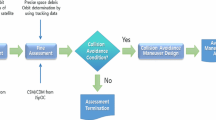Abstract
In view of the increasingly space environment's threat to the safety of satellites on orbit, this paper carries out the research on satellite trajectory planning method for avoiding space debris (non-confrontation) on the basis of the satellite's mission requirements and dynamic characteristics. In order to make the satellites have the ability to avoid space debris and return to the predetermined orbit, this paper proposes a space debris avoidance framework based on the combination of improved Lyapunov Guidance Vector Field (LGVF) and Interfered Fluid Dynamic System (IFDS) algorithm. Further, the receding-horizon optimization (RHO) and particle swarm optimization (PSO) strategy are adopted to optimize the parameters of IFDS algorithm, which realize that the satellite returns to the predetermined orbit as soon as possible after avoiding space debris with a small offset under low fuel consumption. Finally, the feasibility and effectiveness of the proposed method are verified by numerical simulations.
Access this chapter
Tax calculation will be finalised at checkout
Purchases are for personal use only
Similar content being viewed by others
References
Patera, R.P.: Space vehicle conflict-avoidance analysis. J. Guid. Control. Dyn. 30(2), 492–498 (2007)
Bombardelli, C., Hernando-Ayuso, J.: Optimal impulsive collision avoidance in low earth orbit. J. Guid. Control. Dyn. 38(2), 217–225 (2015)
Gonzalo, J.L., Colombo, C., Di Lizia, P.: Analytical framework for space debris collision avoidance maneuver design. J. Guid. Control. Dyn. 44(3), 469–487 (2021)
Huang, X., Yan, Y., Zhou, Y., et al.: Dual-quaternion based distributed coordination control of six-DOF spacecraft formation with collision avoidance. Aerosp. Sci. Technol. 67, 443–455 (2017)
Hu, Q., Dong, H., Zhang, Y., et al.: Tracking control of spacecraft formation flying with collision avoidance. Aerosp. Sci. Technol. 42, 353–364 (2015)
Wang, Y., Wang, H., Wu, J., et al.: UAV standoff tracking for narrow-area target in complex environment. IEEE Syst. J. 16, 4583–4594 (2021)
Yao, P., Wang, H., Su, Z.: Real-time path planning of unmanned aerial vehicle for target tracking and obstacle avoidance in complex dynamic environment. Aerosp. Sci. Technol. 47, 269–279 (2015)
Zhang, M., Wang, H., Wu, J.: On UAV source seeking with complex dynamic characteristics and multiple constraints: a cooperative standoff monitoring mode. Aerosp. Sci. Technol. 121, 107315 (2022)
Jianfa, W., Wang, H., Zhang, M., Yue, Y.: On obstacle avoidance path planning in unknown 3D environments: a fluid-based framework. ISA Trans. 111, 249–264 (2021). https://doi.org/10.1016/j.isatra.2020.11.017
Wu, J., Wang, H., Li, N., et al.: Formation obstacle avoidance: a fluid-based solution. IEEE Syst. J. 14(1), 1479–1490 (2019)
Acknowledgement
The authors would like to express their acknowledgment for the support from the National Natural Science Foundation of China (No. U21B6001) and China Postdoctoral Science Foundation (No. 2022M713006).
Author information
Authors and Affiliations
Corresponding author
Editor information
Editors and Affiliations
Rights and permissions
Copyright information
© 2023 Beijing HIWING Sci. and Tech. Info Inst
About this paper
Cite this paper
Yang, Z., Wang, H., Liu, Y., Zhang, M., Wu, J. (2023). Satellite Trajectory Planning for Space Debris Collision Avoidance. In: Fu, W., Gu, M., Niu, Y. (eds) Proceedings of 2022 International Conference on Autonomous Unmanned Systems (ICAUS 2022). ICAUS 2022. Lecture Notes in Electrical Engineering, vol 1010. Springer, Singapore. https://doi.org/10.1007/978-981-99-0479-2_258
Download citation
DOI: https://doi.org/10.1007/978-981-99-0479-2_258
Published:
Publisher Name: Springer, Singapore
Print ISBN: 978-981-99-0478-5
Online ISBN: 978-981-99-0479-2
eBook Packages: Intelligent Technologies and RoboticsIntelligent Technologies and Robotics (R0)




